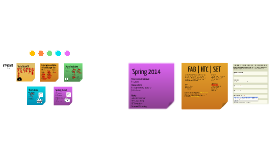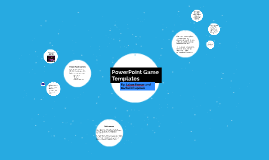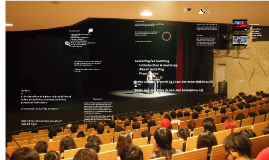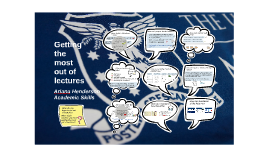Lectures for learning
Transcript: Wrong. Understanding (anything) requires a more up to date, interactive style of teaching, with demonstration, and small-group discussions. Interest will continually rise, sometimes peak, and occasionally drop down a bit only in anticipation of rising again. Vary your responses Paraphrase Re-frame Correct Challenge Converse Discussion What are the characteristics of a good lecture(r)? Captivate students from the beginning! The concept of having something at the beginning of each lecture to settle and engage the students, is a worthwhile one. "The hook", something that grabs you and gets you excited about the experience. The screaming guitar riff in the Beatles song 'revolution', the ghost scene in hamlet, the brutal murder in the Danish TV series 'the killing'. Practice run: Tell us about your work. 2 min. Pay attention to your beginning and end, body language and use of your voice. 5 minutes to prepare. How many lectures have you given? How did it go? What are your rules for lecture attendance? Good to know.... Provide clear instructions (!) Lectures are one of the tools in a teacher's arsenal of teaching methods, one we (at AUAS/HvA) frequently use. Leave them wanting more! Practice run 2: (if there is time) What makes a good presenter? Vary your format Think, share, pair Role playing Debate Voting How do you establish classroom etiquette and deal with disruption? Lectures in higher education have survived much opposition, this suggests that they are a much more effective teaching method than they are given credit for. Lectures have been proven to be well-suited to the transmission of conceptual and systematic knowledge. It's cheap too. Easy to use: An anecdote A question A statement A news article A quote lec·ture n. 1. An exposition of a given subject delivered before an audience or a class, as for the purpose of instruction. v. lec·tured, lec·tur·ing, lec·tures The computer isn't working, there is no way of fixing your slides. What do you do? A climax of some kind Into the experience with some level of interest. Expectations are influenced by packaging, advertisements, advice from friends etc. Body language Eyecontact Hands and arms Standing/sitting Posture Breathing Dress to impress? Practice Focus Feedback Students are present, but are obviously focussed on everything other than your lecture. What do you do? On average, people can concentrate on what you are saying for about 12 (!) minutes maximum Vary your Questions Diagnostic Challenge Prediction Role playing Closing time By ending your lectures well you have given students the chance to 'come full circle' by providing a: positive start, purposeful middle and reflective end, all of which are key ingredients when creating a dynamic lecture. After 50 minutes students are starting to disrupt your lecture. "How about a break?" one of them shouts...what do you do? What do you expect from your students? What can they expect from you? So let's have a short break 200 students are supposed to attend your lecture, only 20 show up. What do you do? As the lecturer, you are having a very different experience than your students! A good lecture(r): Has a well-defined structure or organization Identifies his/her audience Has been rehearsed Is interactive and varied Finds out where his/her topic fits into the curriculum/syllabus is well presented Lecturing for learning Introduction & warm-up About lecturing Practice run Jerke van der Woerdt (g.j.van.der.woerdt@hva.nl) & Bram van der Kruk (b.van.der.kruk@hva.nl)

















